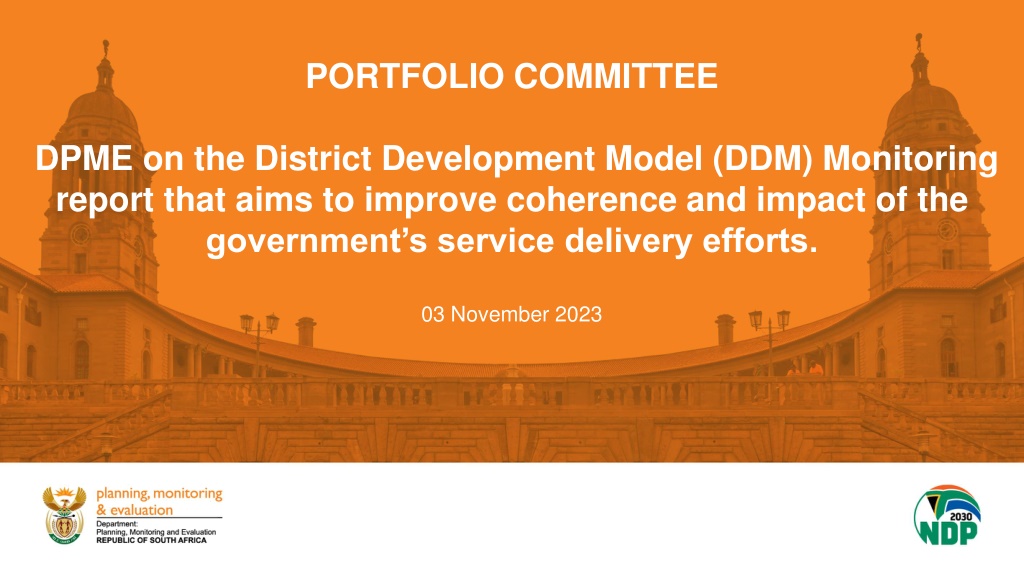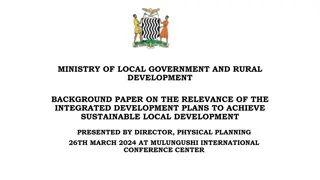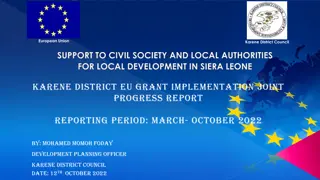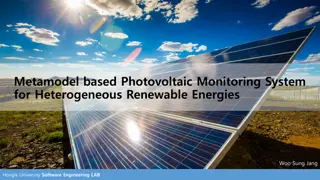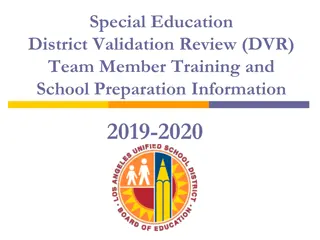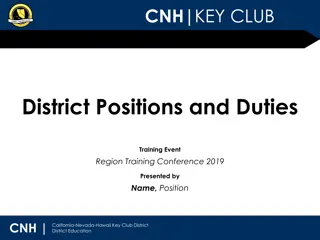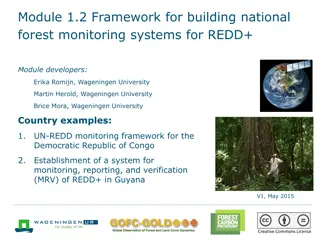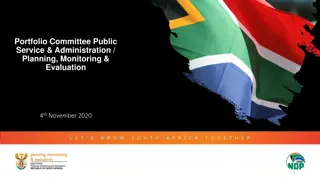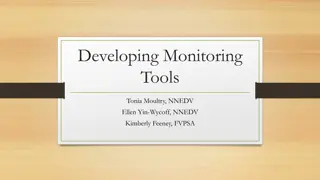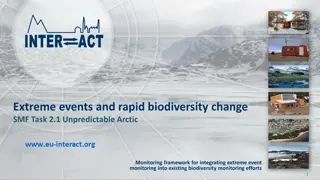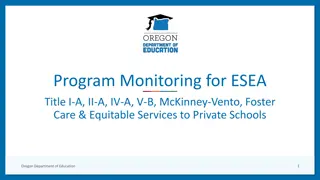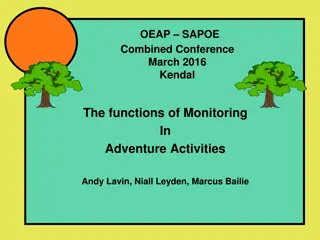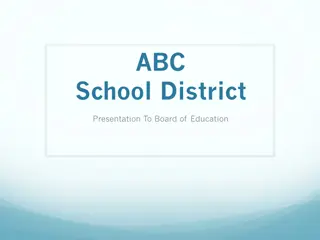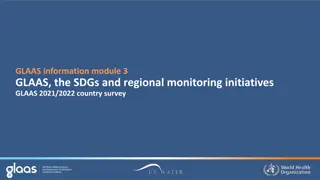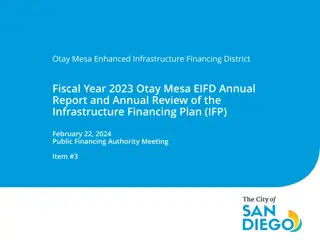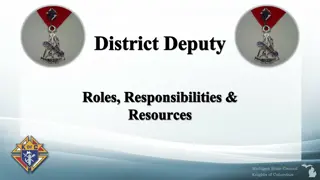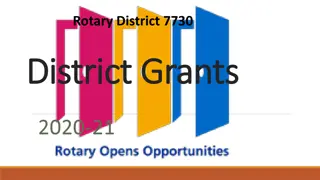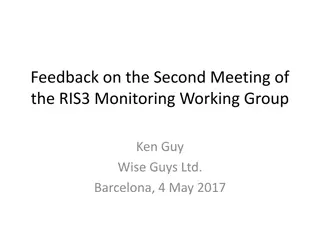District Development Model (DDM) Monitoring Report Overview
The District Development Model (DDM) aims to enhance government service delivery by promoting integrated planning and collaboration across all government spheres and stakeholders. President Ramaphosa initiated the DDM in 2019, assigning coordination to the Minister of COGTA. The DDM focuses on improving delivery outcomes, fostering inclusive growth, creating jobs, and transforming communities. Various coordinating structures at national, provincial, and municipal levels are established to oversee DDM implementation.
Download Presentation

Please find below an Image/Link to download the presentation.
The content on the website is provided AS IS for your information and personal use only. It may not be sold, licensed, or shared on other websites without obtaining consent from the author.If you encounter any issues during the download, it is possible that the publisher has removed the file from their server.
You are allowed to download the files provided on this website for personal or commercial use, subject to the condition that they are used lawfully. All files are the property of their respective owners.
The content on the website is provided AS IS for your information and personal use only. It may not be sold, licensed, or shared on other websites without obtaining consent from the author.
E N D
Presentation Transcript
PORTFOLIO COMMITTEE DPME on the District Development Model (DDM) Monitoring report that aims to improve coherence and impact of the government s service delivery efforts. 03 November 2023
Presentation Overview DDM Background and Introduction DDM Objectives and Implementation Approach Overview of DDM Coordination Structures DDM Coordination Structures Role of DPME in the DDM DDM and Local Government Monitoring and Evaluation Systems Role of COGTA in the DDM DDM Implementation update : Institutionalisation Provincial DDM update Recommendations and Conclusion 2
DDM Background and Introduction DDM was initiated by President Ramaphosa in 2019 and adopted by Cabinet. The Model is a practical Inter Governmental Relations (IGR) mechanism. Enables all spheres of government to work together with stakeholders on integrated planning budgeting and implementation. The President assigned the coordination of the DDM to the Minister of COGTA Ensure effective DDM coordination and implementation Mobilise all sectors of society to participate in the DDM and coordinate the implementation of programmes and projects in spaces within the DDM framework. Produce regular reports on the implementation of DDM in the various districts and metros. DDM Izimbizo coordination. The DPME is Chairing Presidential DDM Steering Committee and monitor the implementation of the DDM 3
The WHY for DDM: end-in-mind (line of sight) to integrated, impactful, fast-tracked development #leaving no one behind from silos = poor & slow service delivery Integration for the accelerated implementation of ONE Plan for each space to achieve the following outcomes: Inclusive growth through leveraging public & private sector investment Create jobs, improved quality of life Transform communities empowerment) sectors (for SMMEs and 5
DDM Co-ordinating Structures Command Executive President s Coordinating Council (PCC) Inter Ministerial Committee (IMC) on Service Delivery & DDM Presidency Steering Committee (PSC) on DDM (DDGs) (Presidency, Cogta, DPME, DALRRD, NT, SALGA) DDM Implementation Coordination Committee (DGs) (Cogta, DPME, DWS, DoH, DBE DHS, DALRRD, DPWI,DSD, DSBD, NT, DWYPwD, DFFE, DTIC, selected national sector cluster chairs, Provincial DGs, GCIS, Salga) Command National COGTA Technical MinMec COGTA MinMec DDM IMS Provincial Command Provincial DDM Technical Committee Provincial Cogta MuniMec Provincial Cogta Technical MuniMec Premier s Coordinating Forum (PCF) Command Municipal District/Metro DDM Technical Committee District Mayors Forum District Municipal Managers Forum DDM District Hub 6
Role of DPME in the DDM DDM Presidency Steering Committee Chairperson: DDG: DPME Accountability: Presidency Members: Presidency, DPME, DCOG, NT, DPSA, GCIS, DALRRD & SALGA Purpose of the committee: Strategic leadership to institutionalise the DDM Localisation of the NDP, MTSF & NSDF through the DDM Oversight, monitoring and evaluation Co-ordinate and mobilise government resources for effective implementation of the DDM; and Facilitate rapid-response actions / intervention through district profiles, planning processes engagement Workstreams: Catalytic projects; Integrated Planning & Budgeting; Monitoring, Evaluation & Management Communications & Stakeholder Management; Political Champion Support. DDM Presidency Steering Committee currently has 5 workstreams: Catalytic Projects (Convener: DALRRD); Planning Reforms (Convener: National Planning Coordination); Monitoring (Convener: DPME PSM); Communication GCIS & DCOG); Support to Political Champions (Convener: Presidency) Note: Workstream Government scrapped due to overlap with other structures. and Budgeting DPME & Evaluation (Convener: and on-going stakeholder on Stabilisation Local Information Systems; 7
DPME Roles National Planning Coordination Support interdepartmental coordination and oversight through the PSC Mainstreaming of the DDM within the overall Planning system: Policy Framework for Integrated Planning includes DDM One Plans and relationship with other plans as well as harmonisation of overall planning system and instruments Revised framework for Strategic Plans and Annual Performance Plans includes provision for DDM projects in a specific format & APPs assessed Budget Prioritisation Framework includes provisions around the DDM Geospatial Referencing Guidelines of DPME enabler for spatialization Guidelines for localisation of government plans in the context of the DDM howto guide for participation in DDM for the 3 spheres of government DDM Information Management System: The EEKS branch participates in COGTA s Technical and Steering committees of the DDM Information System (monthly). Officials provide input towards the functional, business and strategic requirements of the project to guide the development of the system. A key challenge towards the development of the system remains access to data contained in external data systems owned by public institutions. 8
DPME Roles MTSF Interventions Public Sector Monitoring & Sector Monitoring Key DDM Interventions Monitored through the MTSF monitoring system 1. Finalisation of institutional arrangements for the District Development Model 2. Monitoring implementation of District Development Model plans through an Integrated Monitoring System for accountability 3. Development of One Plans in the District and Metro municipalities 4. Providing technical support to the DDM Champions in the Presidency (Minister & Deputy Minister) 9
DDM and the Local Government Monitoring and Evaluation Systems Local Government Management Improvement Model (LGIMIM): Assess the quality of management practices of municipalities and provides a holistic or integrated picture of the state of the municipalities The assessment results are used by municipal management to improve performance and transversal departments to provide targeted support Local Government Monitoring Framework (Circular 88) Circular No. 88 provides guidance and supports standardisation of performance information at municipal level which serves as critical local government system capability development. DDM Barometer Assess the state of performance of Municipalities and provide support to dysfunctional Municipalities Frontline Service Delivery Monitoring Monitoring the implementation of the DDM to enhance delivery of services DDM National Strategic Hub To provide the President and Cabinet with the single view of the situation across the country to enhance better coordination
Role of COGTA in the DDM The President assigned the coordination of the DDM to the Minister of COGTA Ensure effective DDM coordination and implementation Mobilise all sectors of society to participate in the DDM and coordinate the implementation of programmes and projects in spaces within the DDM framework. Produce regular reports on the implementation of DDM in the various districts and metros. DDM Izimbizo coordination. COGTA IS EXPECTED TO: 11
DDM IMPLEMENTATION UPDATE: INSTITUTIONALISATION Current Status Legal and specific content comments and inputs received from the 30 days public comments (due date was 03 September 2023) on the published draft sec.47(1)(b) of the Inter Governmental Relations Framework Regulations (IGRFRA) are being considered and incorporated. National DDM Political Champions have been assigned and confirmed by the Honourable President by the end of July 2023- confirmations were sent to Ministers and Deputy Ministers. 9th Presidential DDM Imbizo held on 11 August 2023 in Tsomo, Eastern Cape. The 2nd round of Presidential DDM Imbizo was held in the North West Province on 20 October 2023 in Dr Kenneth Kaunda District to assess the progress made on the previous imbizo commitments. Action Institutionalising the DDM by making it mandatory for all national and provincial de partments as Well as State-Owned Entities to participate in the planning, Implementation and monitoring support to Municipalities (Cabinet resolution, 02 August 2022) Next Steps Finalise the inputs obtained through the call for public comment by end of Q2/beginning of Q3 of the 2023/24 FY. Draft proposed revisions made to the ToR and reporting template for political champions together with the private office of the President; develop a tracking and monitoring tool for political champions reports by mid Q3 of the 2023/24 FY. Consolidate reports from political champions for the April- August 2023 period. The due date was 30 September 2023 as requested by the private office of the President, by mid Q3. Consolidate progress reports on Presidential DDM Izimbizo outcomes as requested by DCOG from OtPs and provincial CGTAs, by mid Q3. Finalise the establishment of the Results Management Office (RMO) within COGTA. DCOG provincial support team providing guidance to those provinces where One Plans are still outstanding Tracking and monitoring of identified catalytic projects in the submitted revised and updated One Plans were submitted through the provincial DDM structures. ONE PLAN IMPLEMENTATION Continue with the updating of the consolidated report on the tracking of the implementation of catalytic projects. 12
PROVINCIAL DDM UPDATE PROVINCE Eastern Cape SUCCESSES The province has submitted all the updated One Plans by 31 March 2023. Intergovernmental implementation commitments in One Plans (ORT-R33b; NMBMM R14.6b; SBDM-R1.6b; Alfred Nzo R145b; JGDM-R8.7b; CHDM-R3.2b; ADM-R318m; BCM-R45.2b) Existing IGR structures are utilised for DDM - Provincial DDM coordination is done through a DDM nerve centre (Prov.COGTA, OtP, PT, ECSECC). Five updated One Plans submitted. OtP and prov.COGTA working with UFS in providing support in improving One Plans. Prov.COGTA working with SALGA in rolling-out a DDM training program for councillors. DDM IGR structures in place. Private sector has to some extend taken part in the development of the One Plans, especially in Lejweleputswa. CHALLENGES Districts and metro requires further engagement with Business, and Civil Society, tertiary institution to co-create the inter-sectoral DDM Work Streams. Lack of National Sector Depts, SOEs, Business and NGO involvement in DDM processes. National departments do not attend IGR meetings, except for SAPS, Home Affairs and the DPME Participation of private sector in the development of One Plans is still a challenge SOEs have not participated in the development of the One Plan Unfunded catalytic projects in One Plans. The province indicated the submission of the updated One Plans will be submitted to COGTA. Free State Sedibeng DDM technical hub established. A DDM GIS and implementation tool developed for the province. Various DDM partnerships established, ie CSIR, Water Research Commission, Mining Qualification Authority, UJ and National School of Government. Gauteng 13
PROVINCIAL DDM UPDATE PROVINCE SUCCESSES CHALLENGES Kwa-Zulu Natal DDM technical and political hubs established in ALL Districts and Metropolitan Municipalities. Eleven One Plans submitted and uMkhanyakude submitted as drafts as currently awaiting the endorsement by the Political Hubs. DDM implementation dashboard developed-quarterly monitoring of One Plan programs and projects. Major challenge with involvement of key national sector Departments, however constant involvement from COGTA, MISA, Labour, SASSA, ESKOM, Correctional Services, Justice and the NPA. Limpopo Final updated One Plans submitted for all Districts Municipalities. The Office of the Premier and Provincial COGTA played a critical role in coordinating the development of the One Plan across the province apart from Waterberg district which as a DDM pilot district, was coordinated through the DDM District Hub. It should be noted that the Waterberg One Plan strictly followed the One Plan Content Guidelines given the technical capacity provided by the DDM Hub and the appointed service provider With regards to the drafting of the One Plans; the districts were mainly tasked with drafting the One Plans with the support of the OTP and CoGHSTA. There is a need to improve the spatial referencing of projects. In this regard, municipalities need to be supported to establish and enhance their GIS capacity. Participation of national and provincial sector departments in the development of the district One Plans was very limited. In this regard, there is a need to strengthen the participation of all spheres in the process which will ensure that the plan becomes an all of government plan Mpumalanga Final updated One Plans submitted for all Districts Municipalities. In Nkangala District (NDM) there are 20 Catalytic Projects in the One Plan- 09 of these projects are funded with an amount of R8, 2 billion. The Gert Sibande District One Plan has 35 funded catalytic projects - 33 of these projects are funded with a budget allocation of R29, 4 billion and 10 projects have been completed. In Ehlanzeni One Plan 13 catalytic projects to the value of R60 billion rand- the Sibange and Driekoppies Bulk Water Schemes (R279 million) is 91% complete. There s still challenges of silos, misalignment and poor integration not adequately addressed by the introduction of the DDM Approach. There was poor participation of key national departments and public entities in the One Plan process. Commitments by Sector Departments do not adequately serve the purpose of realizing the objectives of One Plans as long- term intergovernmental plans since there is only provision for annual programmes and projects, some at the level of the IDP. 14
PROVINCIAL DDM UPDATE PROVINCE SUCCESSES CHALLENGES Northern Cape Final updated One Plans submitted for all Districts Municipalities. One plan projects are included in the IDPs of ALL district and local municipalities. Limited expert capacity for the coordination of the DDM and the implementation Limited legislated instruments for the facilitation of One Plans and One Budget DDM structures were established though they only convene when the Political Champions is visiting the District. DDM implementation is a standing item at District IGR forum North West Final updated One Plans submitted for all districts. It remains critical for National and Provincial Sector Departments to become participants at a strategic level. Identification of key stakeholders outside of government (development of a matrix of stakeholders) could not be concluded as information relating to this is known by the Provincial and National Sector Departments. In this regard, Districts should be supported to identify these stakeholders as they relate to each District. Western Cape Updated Joint and District Metro Implementation (JDMA) Plans / One Plans submitted for the 5 districts. No One Plan submitted for the City of Cape Town Metropolitan space. Provincial Ministers and HoDs assigned to Districts to strengthen interface within government. JDMA interface teams consists of senior officials per District set-up. Department Local Government set-up a JDMA Grant to provide funding for key service delivery projects identified through the JDMA There is a need for improved commitments and participation by National Departments and SOEs in ALL Districts. Changes in Municipal Councils and the effects of coalition governments impacts negatively on the JDMA 15
Critical next steps DPME and DCOG to streamline roles and responsibilities for better coordination and monitoring of the DDM Enhance inter-governmental relations and institutionalisation of DDM across government Monitoring of the early warning systems, rapid response mechanisms and practical interventions to pre-empt and respond to crises at local government level Monitor and improve the performance of government and strategic focus on results Better leverage and support the roles of Political Champions on DDM Monitoring the implementation of the National Strategic Hub on DDM. 16
